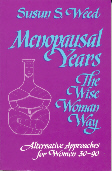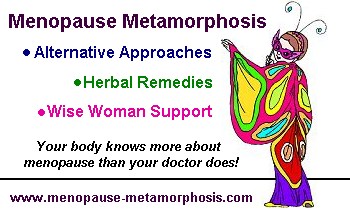"Open your heart to me, my own," whispers Grandmother
Growth so softly you aren't certain you hear her. "Open the wisdom
way of compassion here in your heart and draw me inside. Let Grandmother
Growth be inside you, helping you encompass the whole, in the beat of
your own heart, my heart, Crone's heart."
Thinking of taking hormone replacement to keep your heart healthy?
Think again. Data released in April of the year 2000, from the federal
government's Women's Health Initiative, showed "a small increase
in the number of heart attacks, strokes and blood clots in the lungs
of women on hormone replacement compared with women on placebo."
The Heart and Estrogen/Progestin Replacement Study (HERS), completed
in 1998, found the same connection. For a healthy heart, don't
take hormones.
"Recently released data from the federal government's Women's
Health Initiative suggests that during the first two years of postmenopausal
hormone replacement therapy there is a slightly greater risk of heart
attack, stroke and blood clots."
Heart disease is America's top killer (claiming a life every 34 seconds).
Women aged 30-50 have far less risk of heart disease than a man their
age. But postmenopausal women die from heart disease at rates as high
as men's. (Women account for 51 percent of all cardiovascular deaths;
men, 49 percent.) Is it lack of estrogen?
No. Estrogen does lower LDL cholesterol and increase HDL cholesterol,
but cholesterol is only weakly linked to heart disease, especially in
women. (Most heart attacks happen to people with normal cholesterol
levels.)
Estrogen raises blood pressure (one of the top three reasons for heart
attacks in women), increases triglycerides, promotes clotting (a leading
factor in heart attacks and strokes), and raises levels of C-reactive
protein (a marker for inflammation associated with heart disease). Take
progestins/progesterone too and you increase your risk of heart disease
even more. Hormone replacement really isn't heart healthy.
Aren't there studies linking estrogen usage to lowered risk of heart
disease? Only retrospective ones, which cannot establish a cause-and-effect
link. And the women in those studies ate well, exercized regularly,
and were unlikely to smoke - behaviors that are critical to heart health.
The simple truth is more than 90 percent of all heart disease is preventable
with lifestyle choices.
The three top risk factors for heart disease in women are too much
belly fat, smoking, and untreated hypertension. High cholesterol is
one of the top three risk factors for men, but not for women. (This
is because, after menopause, we make heart healthy hormones from our
cholesterol.)
The Nurses Health Study - which followed 86,000 women for 14 years
- shows what happens to those wise old Crones who follow heart healthy
behaviors:
+ Those who ate more fish than meat, plus plenty of whole grains, beans,
leafy greens, fruits, and vegetables reduced their risk of heart disease
by one-third compared to those who ate a "normal" American
diet. Eating one serving a day of whole-grain foods reduced heart attacks
by 34 percent in another study of 34,000 postmenopausal women.
+ Those who are at least 5 ounces of nuts a week were only half as
likely to have a heart attack as those who ate none.
+ Women who walked a total of three hours per week or who exercised
vigorously for at least 90 minutes a week had one third fewer heart
attacks than women who got no exercise. Those who walked five or more
hours a week cut their risk in half.
o Rose flower essence and rose quartz essence are both recommended
for engaging the energy of the heart.
o Do you attack your heart? Do you close your heart to protect it?
Love yourself. Give yourself plenty of nice strokes so you won't have
a bad stroke. Try Stephen Levine's meditation "Opening the Heart"
in Who Dies?
o People in Hawaii, New Mexico, and Arizona have the healthiest hearts
in the United States. Imagine you live there.
 Smile! Depression
increases your risk of both heart attack and stroke. In fact, severe
depression is more strongly linked to stroke risk than high blood pressure,
high cholesterol, smoking cigarettes, being overweight, and nine other
known risk factors. When you smile, your brain makes hormones that make
you, and your heart, feel good. So, smile.
Smile! Depression
increases your risk of both heart attack and stroke. In fact, severe
depression is more strongly linked to stroke risk than high blood pressure,
high cholesterol, smoking cigarettes, being overweight, and nine other
known risk factors. When you smile, your brain makes hormones that make
you, and your heart, feel good. So, smile.
~ Touch and be touched. In numerous scientific studies, people who
were touched lovingly every day had significantly fewer heart problems
than those who weren't.
~ Nuts to heart attacks. The fats in nuts have been linked to a reduced
risk of heart attacks. Volunteers on high-fat diets (35-40 percent of
calories nuts and olive oil) lowered their LDL cholesterol by 13 percent.
Greek women do the same, and have one of the lowest rates of heart disease
in the world.
o Essential fatty acids, especially omega-3s, are ever so essential
to a healthy heart. Look for them in fish (salmon, sardines, trout,
herring are highest), seeds, whole grains, beans, and nuts. They are
especially abundant in wild seeds such as plantain, lamb's quarter,
and amaranth. And in freshly ground flax seeds. Women who consume the
EFA alpha-linolenic acid daily have the lowest risk of a fatal heart
attack.1
~ Keep your heart healthy with regular use of seaweeds. Seaweeds have
clinically proven cardiotonic effects: they stabilize blood pressure;
regulate levels of triglycerides, phospholipids, and cholesterols; prolong
the life of the heart muscle; and encourage a steady heart beat.
o Women who regularly eat foods rich in carotenes cut their risk of
stroke by 40 percent. Women who eat broccoli at least once a week have
roughly half the risk of heart disease as women who eat none.
~ Eliminating or limiting carbohydrates, especially refined flours
and sugars, has halved the cholesterol of several friends whose totals
were above 400.
"What emerges is a clear association of heart disease with . .
. consumption of devitalized, processed, fabricated food items, including
sugar and fructose, soft drinks, fortified white flour, milk and egg
powders, caffeine, imitation broth products, synthetic vitamins, vegetable
oils, and hydrogenated fats." -- Sally Fallon
~ Garlic, Knoblauch, Ail (Allium sativum) is a great friend to old
hearts. Several cloves a day of fresh, raw garlic can lower blood pressure,
reduce phospholipids and cholesterol, strengthen heart action, increase
immune response, reduce platelet clumping and clotting (thus reducing
strokes), and stabilize blood sugar levels.
Don't like raw garlic? Use powdered! A four-year study found women
who ingested 900 mg (1/4 teaspoonful) of garlic powder daily had 18
percent less arterial plaque than those taking a placebo.
~ Hawthorn berry tincture is the standard herbal heart tonic, and for
good reason. It is broadly effective, virtually without overdose, and
easy to make from fresh or dried berries. An elegant shrub or small
tree, hawthorn is frequently cultivated in the suburbs.
Injectable forms of Crataegus were used by MDs up until the 1950s to
treat vascular heart disease, high blood pressure, inflammation of the
heart muscle, and arteriosclerosis.
The action of hawthorn is slow but complete. It strengthens the heart,
establishes a regular heart beat, relieves water build-up around the
heart, and resolves stress throughout the cardiovascular system. Dose
is 25-40 drops of the berry tincture, up to 4 times a day. Expect results
no sooner than 6-8 weeks.
~ Motherwort, that dear friend of menopausal women, is a favorite heart
tonic. A dose of 10-20 drops of the tincture of the flowering tops,
taken up to three times a day, helps lower blood pressure, strengthen
heart action, ease palpitations and irregular heartbeats, and make room
in the heart for compassion.
~ Keep your heart healthy by eating chocolate. Sound too good to be
true? Despite its reputation, chocolate is loaded with heart healthy
phytochemicals. Cocoa's tretramers curb oxidation of the blood vessel
walls, short-circuiting the build up of atherosclerotic plaque; they
also help keep the vessels relaxed, keeping blood pressure down.
Chocolate's flavonoids are more powerful than vitamin C in limiting
oxidation of LDL; they protect all lipids in the blood from free-radical
damage. Procyanidins are flavonoids that work like mild aspirins, keeping
the blood thin and free-flowing.
Polyphenols are heart-healthy substances found abundantly in red wine,
green tea, and chocolate. Daily use may prevent stroke by delaying blood
clotting time. (.75 ounces/20 grams of dark chocolate = one-half cup
tea = one glass red wine.)
Chocolate also prevents blood platelet fragmentation (which occurs
when platelets get sticky), and boosts HDL (good) cholesterol. No wonder
it often comes in heart-shaped boxes!
o Lemon balm is so strengthening to the heart, it is said those who
drink it daily will live forever. Brew fresh or dried leaves in a cup
of water for 5-10 minutes. Or steep fresh leaves in a glass of white
wine for 1-2 hours and drink with dinner. Or enjoy 1-2 tablespoons/15-30
ml of the vinegar.
o You don't have to sweat, but you do have to move! to keep your heart
healthy. However you can do it, do it; no excuses.
o Dandelion root tincture lowers blood pressure and keeps your heart
and cardiovascular system healthy and happy. Use 10-15 drops with meals.
~ If you eat meat, be sure to eat whole grains and beans. Homocysteine
is concentrated in the blood of those who eat a lot of animal protein
and don't get enough B vitamins to process it completely.
See New Menopausal Years the Wise Woman Way, Alternative Approaches
for Women 30-90 for Heart Healthy steps 4, 5, and 6 of the Six
Steps of Healing
 Heart Healthy
Life Style Hints
Heart Healthy
Life Style Hints
 Eat whole
grains, nuts, and beans daily.
Eat whole
grains, nuts, and beans daily.
 Eat lots
of fruits and vegetables every day.
Eat lots
of fruits and vegetables every day.
 Eat fatty
fish at least once a week.
Eat fatty
fish at least once a week.
 Eat dark
chocolate regularly.
Eat dark
chocolate regularly.
 Eat a high
monounsaturated-fat diet.
Eat a high
monounsaturated-fat diet.
 Stop smoking.
Stop smoking.
 Exercise
daily.
Exercise
daily.
 Maintain
a healthy weight; don't diet.
Maintain
a healthy weight; don't diet.
 Stop Smoking
- Heart Healthy Hints
Stop Smoking
- Heart Healthy Hints 
Tobacco is highly addictive and you can beat it. Get an extra edge
on quitting by nourishing yourself with a handful of freshly toasted
sunflower seeds and a cup of nettle or oatstraw infusion daily for 4-6
weeks before you stop smoking. Sunflower seeds reduce cravings for nicotine
by filling nicotine receptor sites. Nettles and oatstraw strengthen
nerves and cushion the impact of withdrawl. Nourish yourself the Wise
Woman Way when you want tobacco:
 Take an
oatstraw bath
Take an
oatstraw bath
 Eat a
wild salad (even if its only one dandelion leaf)
Eat a
wild salad (even if its only one dandelion leaf)
 Bring
home a flower
Bring
home a flower
 Let someone
cook dinner for you
Let someone
cook dinner for you
 Go to
a yoga class or a martial arts class.
Go to
a yoga class or a martial arts class.
 Buy something
for yourself instead of cigaretes.
Buy something
for yourself instead of cigaretes.
 Miss your
smoke break? Take a break for pleasure!
Miss your
smoke break? Take a break for pleasure!
 A weight
gain of 15 pounds/7 kilos is normal for quitters
A weight
gain of 15 pounds/7 kilos is normal for quitters
 Nicotine
withdrawl causes constipation (remedies p. 44)
Nicotine
withdrawl causes constipation (remedies p. 44)
 Read,
get, buy The No-Nag, No-Guilt, Do-It-Your-Own-Way Guide to Quitting
Smoking by Tom Ferguson, MD, Ballantine, 1987.
Read,
get, buy The No-Nag, No-Guilt, Do-It-Your-Own-Way Guide to Quitting
Smoking by Tom Ferguson, MD, Ballantine, 1987.
 See New
Menopausal Years the Wise Woman Way, Alternative Approaches for Women
30-90 for more great Heart Healthy tips and hints....
See New
Menopausal Years the Wise Woman Way, Alternative Approaches for Women
30-90 for more great Heart Healthy tips and hints....

If you liked this excerpt by Susun S.
Weed, you will want
NEW Menopausal Years the Wise Woman Way:
 Alternative Approaches for Women 30 - 90
Alternative Approaches for Women 30 - 90
by Susun S. Weed
Foreword by Juliette de Bairacli Levy.
304 pages, index, magical illustrations.
Completely revised with 100 new pages. All the remedies women know and trust plus hundreds of new ones. New sections on thyroid health, fibromyalgia, hairy problems, male menopause, and herbs for women taking hormones. Recommended by Susan Love MD and Christiane Northrup MD.
Retails for $27.95
Read Juliette de Levy-Bairacli's introduction:
This
book should be in the hands of every woman, of every race,
no matter
what age, worldwide.
Read some excerpts:
Building Better Bones
Kundalini Meditation
Order New Menopausal Years in our Bookshop
"If this book had not been given to me by a close friend, I would be experiencing menopause in an entirely different manner. The Wise Woman approach to the various and unexpected discomforts and joys of the Change has motivated me to seize this experience to transform my life for the better."

 Heart Healthy
Heart Healthy


